The face world missed yesterday was familiar to New Delhi
To the Pentagon, he was an outright liar. But to the millions who watched him on TV for all of three weeks, especially in the Arab world, he...

To the Pentagon, he was an outright liar. But to the millions who watched him on TV for all of three weeks, especially in the Arab world, he was the voice of Iraqi defiance.
Always spewing venom at Coalition ‘‘snakes slithering in the desert… the criminal bastards being slaughtered at the gates of Baghdad,’’ it was just as well that Mohammed Saeed al Sahaf chose to melt from world view on the day his master’s regime collapsed. As Saddam’s information minister, he played the role to the very last.
The Sahaf chat show will long be remembered, beamed as it was to a global audience by every network operating inside Baghdad. But not many in India know the 63-year-old’s India connection. He was the Iraqi envoy to New Delhi in the 1970s and Indian diplomats say he was an ‘‘affable, talkative and a courageous man.’’
No disputing that because, when it was raining bombs of every kind and sound for three weeks in Baghdad, there was one man who refused to shut up, telling ‘‘criminal Bush and Blair’’ what he thought of them and reminding the world that the pictures of US tanks in the Iraqi capital were ‘‘all lies.’’
When Saddam Hussein visited New Delhi and the then Prime Minister Indira Gandhi travelled to Baghdad, Sahaf was Ambassador in New Delhi from 1974-76. Former Foreign Secretary Romesh Bhandari, who was then New Delhi’s man in Baghdad, remembers Sahaf: ‘‘He was a stauch Baathist whose total loyalty made him find his way into the inner circle of Saddam Hussein.
‘‘He was extremely fond of India and fully supportive of our position on Kashmir. Sahaf was sociable, very intelligent, articulate and networked into the Indian political system. During his long association with India, he had developed personal rapport with political parties.’’
Sahaf last visited India on November 22 last year as Saddam’s special envoy. His mission was to brief New Delhi that Baghdad would fully comply with UN Security Council resolution 1441. Unable to meet Prime Minister Atal Behari Vajpayee, he explained the Iraqi position lucidly to External Affairs Minister Yashwant Sinha and his host, the then Information Minister Sushma Swaraj. Official work apart, Sahaf made South Block officials run around and fix meetings with his old Indian friends.
When his Indian interlocutors pointed to reports which accused the Iraqi president of commiting atrocities on Shias and Kurds, Sahaf apparently shot back: ‘‘If Saddam was against Shias, then how come I, a Shia Muslim, have become his Information Minister.’’
His loyality to Saddam paid him rich dividends. He served as Iraqi foreign minister for over a decade until Saddam’s son Uday had him removed in April, 2001. After his stint in India, he had been the Iraqi envoy to Italy, United Nations, head of the Iraqi foreign office and deputy to then Foreign Minister Tariq Aziz. But India was never far from Sahaf’s mind.
As head of the Iraqi foreign office during Operation Desert Storm in 1991, Sahaf not only coordinated with his Indian counterparts but, as Bhandari recalls, also had a line open with the Congress party.
The relationship was mutual. Any Indian leader visiting Baghdad would make it a point to meet Sahaf. Petroleum Minister Ram Naik, who was the last Indian minister in the Iraqi capital last July, met Sahaf. As did Najma Heptulla when she led a Parliamentary delegation last year.
It’s possible Sahaf survived the American raids, disappearing like other leaders of the regime. Not many in Iraq are going to shed tears over the end of the regime but audiences the world over are going to miss the liveliest show from Baghdad.
Photos



- 01
- 02
- 03
- 04
- 05




























